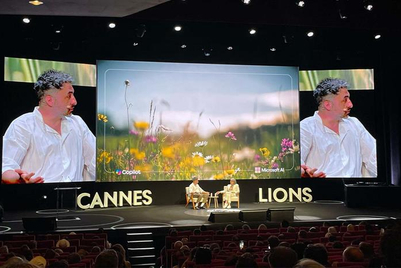
Risk brings rewards in creativity if it is calculated, and more CMOs need to be willing to tread new ground for the best work, Barby Siegel, CEO of Zeno Group, told Campaign Asia-Pacific.
As one of only five PR agencies to win a Cannes Lion in the PR category this year—Zeno finished with a gold and a bronze (below)—Siegel says the results should be “a wake-up call” to the industry regarding creativity.
Communications firms need to be “as sharp and powerful as possible” regarding creativity in their work, and often that comes down to convincing a CMO to take a risk, she said.
“I have yet to sit down with a CMO who says ‘just give me a safe idea’,” she said. “They all want a big idea. The question is how far they will go. We can give a client an idea that takes them from A to Z in terms of unexpectedness and risk. If we meet them halfway, that’s progress.”
Siegel said that it’s crucial to ensure the risk and creativity serves a specific purpose for clients, which can help them become more comfortable with the idea of trying something new.
“It’s about starting with a core human insight and truth, grounding your thinking in data, and understanding your audience and their values,” she said.
“It’s about being brave enough to take a risk with a big idea, and being equally brave to say ‘that’s not the creative that’s going to drive a business result’. Creativity for creativity’s sake is not what we’re in the business of.”
The appetite for risk-taking, however well managed, is different in each market, and Siegel said she understands that it often meets with greater resistance in parts of Asia-Pacific.
“It’s a delicate balance because you have to understand not only the culture in the company that you’re working for, but here in Asia we need to be cognizant of the culture of the market. Some markets will tolerate more risk than others.”
Siegel sees Zeno Group as being something of a “provocateur” for its clients in terms of risk-taking, and thinks agencies should all be striving to push boundaries.
“We want to provoke a different kind of conversation with the client, versus coming in and not having a point of view. That’s boring. A client should want an agency that pokes at them a little bit. We all want to be pushed to a better place.”
As the industry continues to converge and develop, particularly in the digital space, Siegel said she is seeing more CMOs be braver in their decision-making almost as a necessity of engaging consumers.
“How do you cut through the clutter if you do the same as you’ve always done?" she said. "I think CMOs are increasingly seeing that they do need to take a risk if they want to differentiate. It’s easy to be safe, but to do something different sets you apart and at the end of the day, that’s what we’re all seeking.”
The timing could not be better for PR agencies to up their creativity game, Siegel said, because the focus on creative storytelling and integration across the industry plays into communications firms’ hands.
“It used to be that advertising was at the top of the communications pyramid," she said. "When I started my career, that’s where it was. And for so many years we talked about one day PR being at the top. Everybody is now seeing that people want trust and advocacy peer-to-peer, and advertising can’t deliver that. It’s no longer about marketing to something, it’s about being co-brand managers and creating conversations and communities.”


.jpg&h=334&w=500&q=100&v=20250320&c=1)


.png&h=334&w=500&q=100&v=20250320&c=1)




.png&h=334&w=500&q=100&v=20250320&c=1)





.png&h=268&w=401&q=100&v=20250320&c=1)
.png&h=268&w=401&q=100&v=20250320&c=1)

